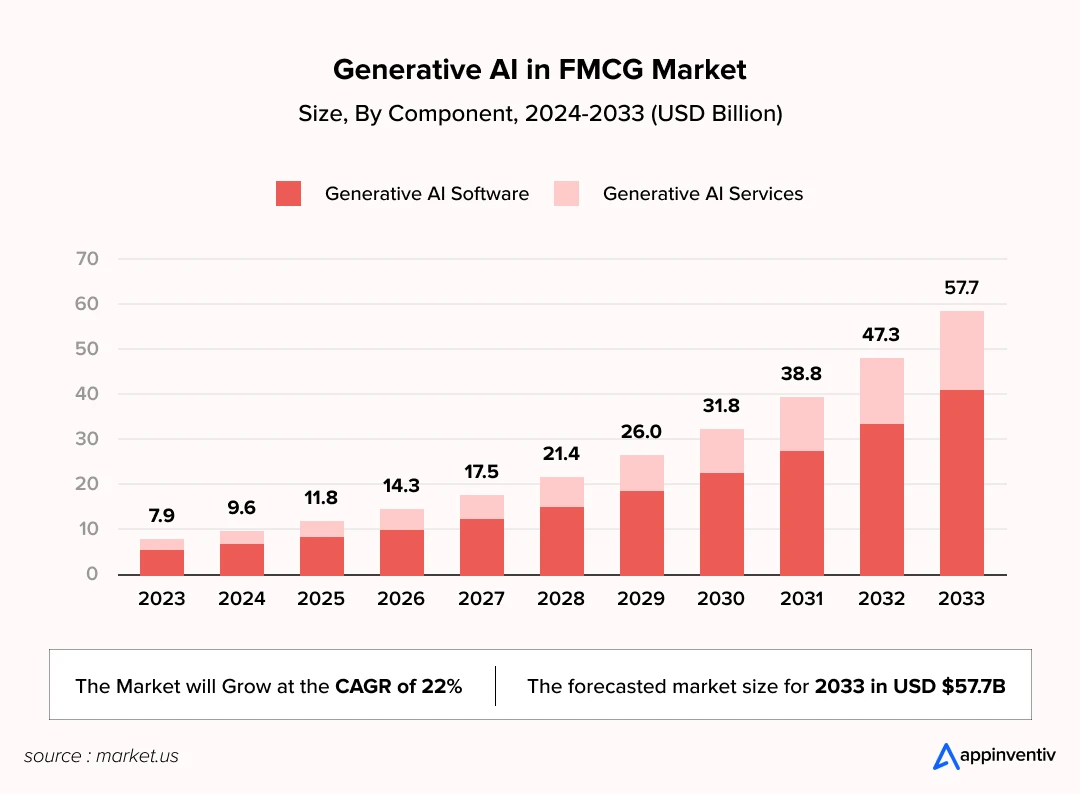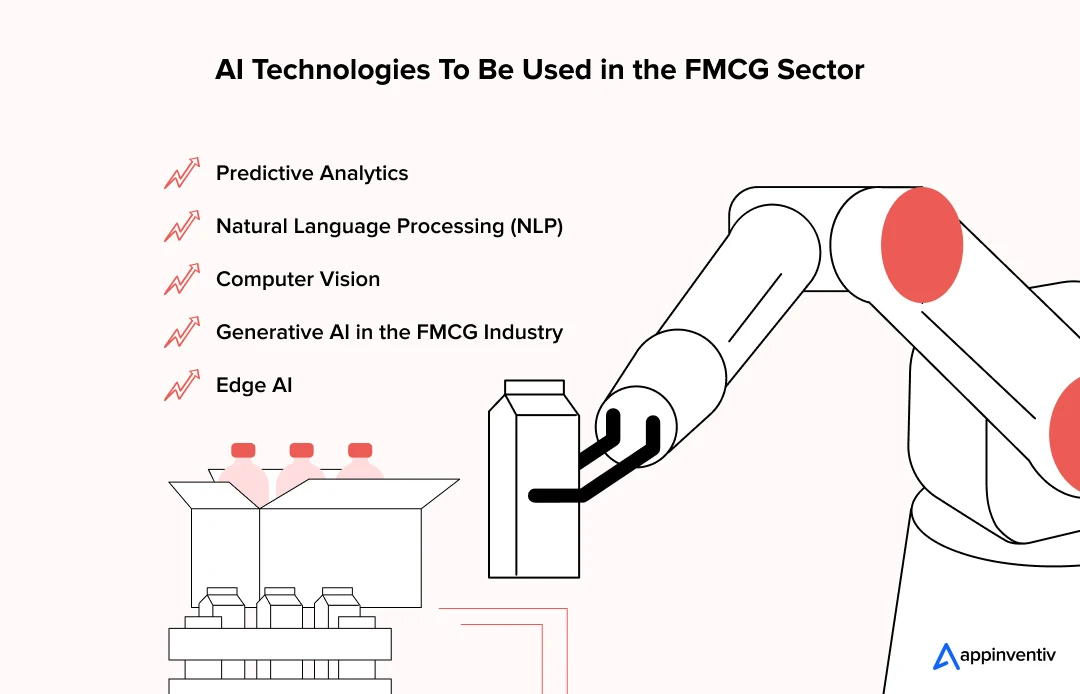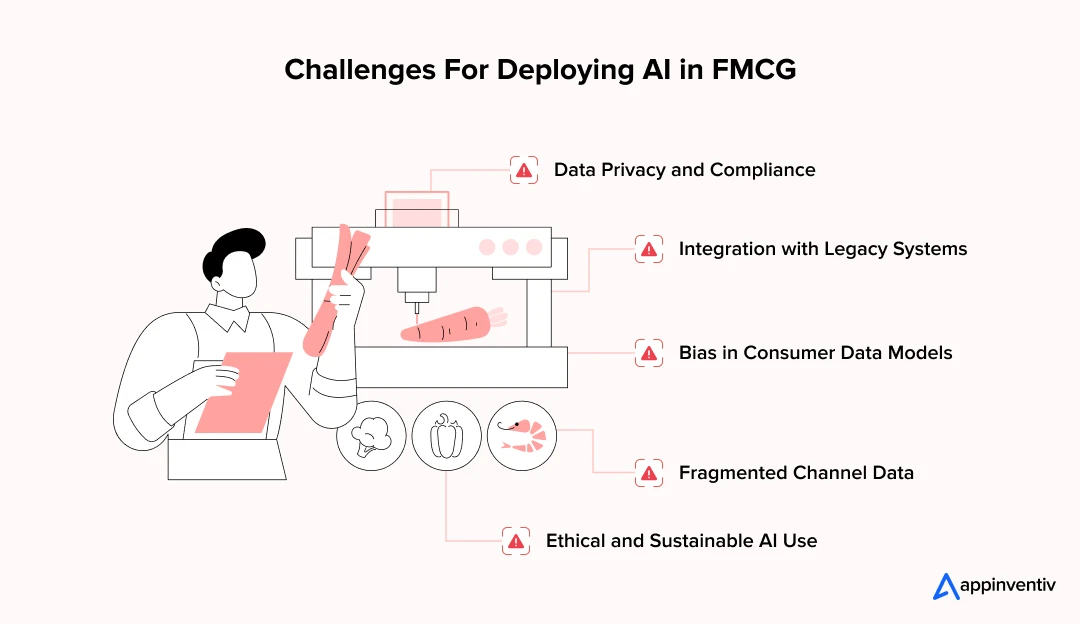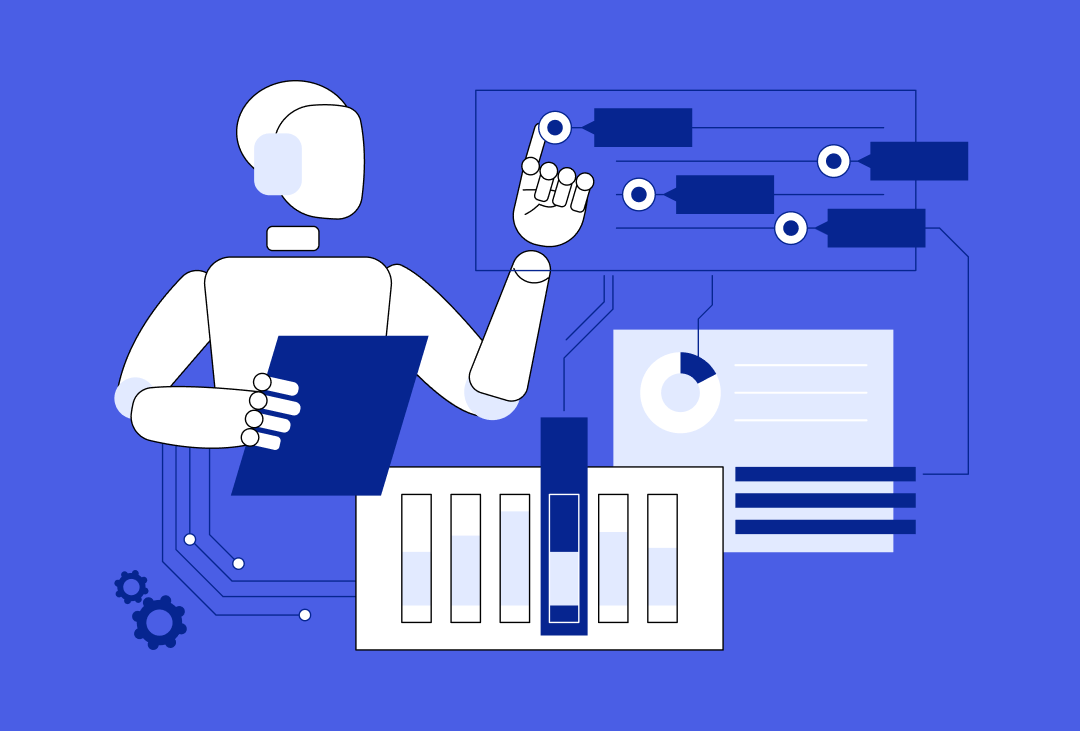Artificial Intelligence (AI) is no longer a concept for the future—it’s quietly becoming the backbone of some of the most iconic consumer brands. In the fast-paced world of FMCG, where shelf space is fiercely contested and consumer preferences shift overnight, brands use smarter technologies to stay ahead, not in theory, but in practice.
The Generative AI revolutionizing the FMCG and the market is expected to grow phenomenally, with its global value reaching USD 57.7 billion in 2033 from USD 7.9 billion in 2023 and at a CAGR of 22% over 2024-2033. (Source: Market.us Report)

This phenomenal growth reflects how FMCG companies leverage Generative AI in the industry to increase innovation, refine customer experience, and increase operational flexibility. With AI within FMCG, brands can swiftly pick up consumer trends and empower them to craft more intelligent supply chains, deliver to market smarter, and create tailored experiences at scale.
This article explores AI in FMCG Use Cases, including how leading brands leverage the technology for a competitive edge. From operational efficiency to intelligent engagement strategies, we will look at how AI is revolutionising FMCG, the Impact of AI in FMCG Use Cases, and the Challenges in implementing AI in FMCG at scale.
Understanding Why You Need AI in the FMCG Industry
The role of AI in retail, especially in FMCG, goes far beyond automation—it represents a paradigm shift in how brands make decisions, deliver value, and stay competitive. With AI use case in FMCG, companies can process massive volumes of structured and unstructured data to make real-time, intelligent decisions by harnessing machine learning, computer vision, and natural language processing.
What is the result of AI in FMCG use cases? Sharper demand forecasting, more supply chain responsiveness, and hyper-targeted consumer experiences that elevate both marketing and operational outcomes.
AI is a strategic investment for CEOs and decision-makers that drives measurable ROI. According to McKinsey, embedding AI in retail (FMCG) operations can create significant value for distributors, including:
- Reductions of 20 to 30% in inventory
- 5 to 20% in logistics costs
- 5 to 15% in procurement spend.
AI also directly supports industry-critical priorities like sustainability, hyper-personalization, and omnichannel performance. FMCG companies are building future-ready operations from eco-conscious packaging designed with generative AI chatbots to enhance customer engagement across platforms. AI empowers every value chain stage—from smart inventory systems and quality control with computer vision to personalized offers informed by sentiment analysis.
Yet, the cost of inaction is steep. FMCG companies that are slow to adopt AI risk falling behind, potentially losing 10–15% of market share by 2030 as competitors seize market opportunities through data-driven precision and agility. To boost FMCG business with AI is not just to innovate—it is to future-proof your brand in a fast-changing, consumer-driven world.
Types of AI Technologies Used in FMCG
AI adoption in FMCG is being spurred by next-generation technologies transforming operations, marketing, and supply chain management. Below is an overview of the most significant role of AI in the FMCG sector that is revolutionizing the workflow:

- Predictive Analytics: Retail predictive analytics drives growth in different ways. It encourages correct demand forecasting and inventory optimization.
- Natural Language Processing (NLP): Reads consumer commentary and reviews to analyze sentiment and product development.
- Computer Vision: Enables retail monitoring, Computer Vision in Retail facilitates on-shelf tracking, and visual merchandising insights.
- Generative AI in the FMCG Industry: Generates engaging packaging art, ad copy, and tailored campaigns in bulk.
- Edge AI: Enables real-time in-store decision-making to facilitate smarter promotions, planogram compliance, and consumer engagement.
These technologies are pivotal in expanding AI Use Cases in FMCG and enhancing decision-making across the supply chain, marketing, and retail execution.
AI Across the FMCG Value Chain: Why Adoption is Accelerating
From FMCG store shelves to R&D labs, AI is making each value chain stage more efficient, agile, and innovative. Here’s how:
- Accelerating FMCG Business with AI – Drives operational efficiency, consumer connection, and top-line growth.
- Hyper-Personalization at Scale – Uses AI to personalize customer experiences, content, and offers to individual consumers.
- Smarter Retail Execution – Provides precise product placement, planogram optimization, and stock availability.
- Agile Demand and Supply Chain Forecasting – Improves the accuracy of predictions and supply chain disruptions with AI in the FMCG supply chain.
- Accelerating Product Innovation – AI in FMCG accelerates speedy ideation and quicker time-to-market.
- Driving Sustainability through Data – AI Use Cases in FMCG enable retailers to understand the opportunities to leverage AI insights to reduce waste, optimize resources, and meet ESG targets.
- Optimizing Omnichannel Performance – Provides an integrated, data-driven solution for online and offline touchpoints.
Global FMCG leaders are already benchmarking by leveraging AI to unleash actionable insights, create smart systems, and future-proof business models. The AI revolutionizing FMCG is no longer a nicety; it’s a competitive necessity.
AI in FMCG Use Cases and Real Examples
The FMCG sector is rapidly evolving, and AI is driving this shift with smarter operations, targeted marketing, and data-led decisions. This section highlights how AI in FMCG actively shapes the industry. These real-world examples represent the role of AI in FMCG: Top use cases that are helping brands boost efficiency, accuracy, and consumer engagement.
AI-Driven Consumer Behavior Analysis: For Enhanced Consumer Insights and Market Research
Today’s data-driven market has made AI-driven tools a must for businesses to remain competitive. Their ability to track consumer behavior across multiple touchpoints, whether online, in-app, or in-store, provides relevant insights into the customer journey. This encourages more targeted market campaigns, thereby increasing conversion rates.
How AI Is Used:
AI models collect and analyze consumer data from surveys, social media usage, buying behavior, and internet activity. Machine learning algorithms uncover trends, habits, and unmet needs, and brands can further refine product plans.
Real Example: Procter & Gamble (P&G)
Procter & Gamble (P&G) uses AI to interpret large datasets on market trends and consumer behavior. This helps them realign product development initiatives and adapt to changing consumer needs. The role of AI in FMCG here is remarkable as it facilitates data-driven innovation that strikes a chord with target customers.
Key Takeaway: AI empowers faster, data-backed decisions in product strategy and innovation.
Predictive Analytics: For Optimizing Supply Chain and Inventory Management
Leveraging data-driven insights to forecast demand, streamline logistics, and optimize stock levels has never been easier for supply chain and inventory management. Data like market trends, consumer behavior, and social media sentiments (NLP model) are used to predict demand, thereby benefiting production schedules and stock level adjustment.
How AI Is Used:
To predict product demand, AI-driven predictive models examine past sales history, market trends, and external drivers (such as weather). They then dynamically adjust inventory orders to prevent overstocking or stockouts.
Real Example: Unilever
Unilever has implemented AI in its supply chain to predict demand and control stock levels better. By reducing overproduction and stockouts, Unilever saves waste and improves operational efficiency, a clear testament to the capability and role of AI in FMCG supply chain innovation.
Key Takeaway: AI enables proactive supply chain responsiveness and reduces operational costs.
Predictive Maintenance: For Automating Production and Operational Efficiency
ML algorithms’ ability to analyze data in real time gives them a superior edge over traditional preventive maintenance strategies. In sectors where equipment failure equals significant downtime and costly repairs (Transportation, Manufacturing, etc.), predictive maintenance is invaluable as it detects patterns and other anomalies that could result in potential machinery failure.
How AI Is Used:
Machine learning algorithms process sensor readings from manufacturing equipment to anticipate wear and likely failures ahead of time, enabling timely maintenance.
Real Example: Nestlé
AI helps Nestlé monitor production gear and predict potential breakdowns. Such predictive maintenance decreases surprise downtimes and boosts manufacturing efficiency, an example of how AI is helping FMCG companies increase business operational resilience.
Key Takeaway: AI increases manufacturing resilience by eliminating surprise equipment failures.
Dynamic Pricing Strategies: For Real-Time Price Optimization
FMCG products are usually distributed in high volumes. Even a small pricing change can abruptly affect revenue and market share. ML models – Reinforcement Learning or Logistic Regression can help predict demand surge and suggest a suitable price to maximize profitability. Conversely, price discounts are another benefit.
How AI Is Used:
AI algorithms constantly examine supply, demand, competitor prices, and consumer activity to suggest dynamic price changes that maximize sales and margins.
Real Example: Coca-Cola
Coca-Cola dynamically changes its product prices based on AI algorithms considering supply, demand, and competing prices. This helps them respond better to the market and capture maximum revenue streams, illustrating how AI in FMCG can best optimize commercial methods.
Key Takeaway: AI allows real-time pricing strategies that optimize revenue and competitiveness.
Advertising and personalized promotions: For Personalized Marketing
Traditionally, FMCG relied on mass marketing campaigns to reach broader audiences. With AI, highly personalized experiences can be tailored to consumer preferences and behaviors. Based on granular segmentation like purchase history, online browsing, etc., this analysis allows brands to craft personalized messages and offer targeted promotions.
How AI Is Used:
AI analyzes customer information, such as purchase history, interests, and online behavior, to create personalized marketing messages and promotions.
Real Example: PepsiCo
PepsiCo uses AI to analyze customer information and tailor promotions based on personal shopping behavior. Hyper-personalization, as this is called, drives not only more engagement but also a higher conversion rate, which represents the application of AI in FMCG marketing approaches.
Key Takeaway: AI boosts marketing ROI through hyper-personalized consumer experiences.
Product Development and Testing For Enhancing Product Development
Consumer insight analysis is one major way AI contributes to new product development. Thanks to ML algorithms, FMCG companies can now analyse large volumes of structured and unstructured data from sources like customer feedback, competitor analysis, etc., further allowing them to identify potential opportunities in emerging trends.
How AI Is Used:
AI forecasts customer reaction to new product ideas based on past introduction records, customer opinions, and focus group opinions, helping to narrow down offerings ahead of launch.
Real Example: Kraft Heinz
Kraft Heinz employs AI technology to test consumer response to new flavor and packaging combinations, reducing the risk of failed launches and accelerating go-to-market time. This demonstrates the impact of AI in the FMCG Industry in shaping transformation and Innovation.
Key Takeaway: AI accelerates innovation cycles and reduces the risk of failed product launches.
Sustainable Practices and Compliance: For Environmental Monitoring and Compliance.
Considering the scale and complexity of FMCG companies’ operations, including manufacturing and vast supply chains, the inclusion of AI plays a major role in tracking and identifying environmental impact. By monitoring metrics like energy consumption, water usage, waste generation, etc., AI algorithms can detect anomalies in ecological standards, further allowing companies to respond quickly.
How AI Is Used:
AI systems track energy consumption, emissions, and resource utilization in real time, providing reports and alerts to guarantee the achievement of sustainability objectives and compliance measures.
Real Example: L’Oréal
L’Oréal implements AI-driven systems to track energy usage and resource optimization. The data also ensures compliance with global environmental regulations. This demonstrates how AI in FMCG contributes to more sustainable and responsible business models.
Key Takeaway: AI ensures compliance and helps build more sustainable operations.
Retail Execution and Shelf Analytics: For Shelf Visibility
Given the high competition and rapid product turnover in retail stores, shelf visibility and compliance with guidelines are critical to FMCG companies. Automated shelf monitoring is one significant application of AI in FMCG. Computer vision algorithms analyze captured images to detect key information about product location, out-of-stock situations, etc.
How AI Is Used:
Computer vision powered by AI inspects images from shelf cameras to identify out-of-stock products, misplaced merchandise, and planogram compliance errors in real time.
Real Example: Mondelez International
Mondelez International utilizes AI-driven shelf-monitoring cameras to track on-shelf availability and planogram compliance. The real-time insights allow retail teams to react more rapidly, driving effective in-store execution and enhancing consumer experiences.
Key Takeaway: AI optimizes in-store execution and improves customer shelf experience.
Customer Service and Support: For Customer Interactions
AI chatbots assist in supporting promotions and product marketing. The primary use remains handling real-time customer enquiries. With the ability to operate 24/7, deliver consistent messaging (important for FMCG brands), and gather customer feedback and sentiment, these AI-enabled chatbots can help identify pain points about any product or a particular buying experience.
How AI Is Used:
Natural language processing (NLP) algorithms drive chatbots that comprehend customer questions, respond instantly, suggest products, and forward complex problems.
Real Example: Johnson & Johnson
Johnson & Johnson uses AI-based chatbots to offer customer service in real-time across platforms. Chatbots respond to inquiries, suggest products, and enhance customer satisfaction—a classic example of how AI-based FMCG can streamline services.
Key Takeaway: AI chatbots enhance customer care and reduce support costs.
Security and Fraud Detection: For Security Enhancement
Counterfeit products damage revenue and diminish customer trust, an important aspect in the FMCG industry. With ML algorithms’ ability to analyse data from inventory systems, logistics, and procurement, FMCG companies can now authenticate products across the entire supply chain. This helps companies respond faster to safeguard sensitive information.
How AI Is Used:
AI systems track transactions and user activity to identify unusual patterns or anomalies that may signal fraud, sending real-time alerts.
Real Example: Top FMCG Brands
FMCG uses AI-powered monitoring systems to detect unusual transaction patterns and prevent fraud. The system protects brand integrity and consumer trust, emphasizing the role of AI in FMCG risk management.
Key Takeaway: AI enhances trust and protects brand reputation through advanced fraud detection.
Generative AI: For Creative Content and Packaging Design
AI is helping FMCG companies to maintain global consistency in delivering relevant marketing of their products. With tools like Adobe Firefly, Midjourney, etc., FMCG brands can generate excellent visual assets via simple text prompts, reducing production costs. AI also helps identify engagement metrics to determine which marketing path performs the best.
How AI Is Used:
Generative AI tools such as Midjourney or Adobe Firefly generate several design options quickly using brand guidelines and consumer trends.
Real Example: Nestlé
Nestlé tests tools like Midjourney and Adobe Firefly to develop engaging packaging designs and culturally contextual marketing content. This speeds up the design process and guarantees that campaigns are customized for various audiences. The emergence of generative AI in the FMCG industry redefines how brands approach creativity and consumer appeal.
Key Takeaway: Generative AI shortens creative cycles and ensures market-relevant branding.
Hyperlocal Demand Sensing with Edge AI: For Micro-Market Analysis
Edge AI has enabled direct data processing at or near the source, like warehouses, delivery vehicles, etc., without relying on cloud infrastructure. With it, FMCG companies can collect and analyze data such as foot traffic, real-time sales, and shelf inventory at the source. This information helps understand what is happening in the micro market in real time.
How AI Is Used:
Edge AI processes sensor data directly at the source (like refrigerators) to track customer interactions and trigger local decisions like restocking, without needing to send all data to the cloud.
Real Example: Danone
Danone utilizes Edge AI sensors in European supermarkets to monitor refrigerator activity and customer dwell time. This data enables quicker restocking decisions and product placement adjustments. Edge AI in FMCG makes local market responsiveness more agile and accurate.
Key Takeaway: Edge AI improves local market responsiveness and product availability.
Voice AI: For Distributor Enablement and Retailer Reordering
ML models like Automatic Speech Recognition, Conversational AI, and Natural Language Understanding are used in this instance. They are specifically trained to understand regional language and other non-standard speech patterns, allowing FMCG brands to serve people who aren’t comfortable typing, reading menus, or navigating.
How AI Is Used:
Voice recognition AI enables retailers and distributors to place orders by speaking naturally in their local languages, making order-taking faster and more inclusive.
Real Example: PepsiCo
PepsiCo created a voice AI solution for its Latin American B2B ordering platform. The system now accepts orders through voice commands in local languages, which makes it more accessible and minimizes order mistakes. This is an example of how AI is assisting brands in detecting consumer trends quickly and adjusting operations accordingly.
Key Takeaway: Voice AI improves accessibility and simplifies distributor operations.
AI-Driven Influencer Marketing Optimization: For Collaborations
AI tools can scan millions of social media profiles across different platforms, analyzing influencer content, engagement rates, audience demographics, and more. This allows FMCG brands to collaborate with those influencers who align with their campaign goals and brand values. AI algorithms can also process historical data, revealing past collaborations and engagement rate history, making it easier for companies to decide in less time.
How AI Is Used:
AI tools analyse influencer profiles, audience engagement rates, and past performance to select the best-fit influencers for specific campaigns and brands.
Real Example: Coca-Cola
Coca-Cola partnered with CreatorIQ to automate influencer discovery and campaign management. AI models evaluate engagement, authenticity, and brand fit, helping Coca-Cola work only with high-impact influencers. This underlines the impact of AI in FMCG marketing performance.
Key Takeaway: AI optimizes influencer partnerships for better brand alignment and reach.
Sentiment Analysis: For Real-Time Brand Monitoring
Considering the speed at which consumer preferences change today, real-time sentiment analysis tends to help companies get a competitive edge much faster. NLP applications for businesses analyze vast datasets from various social media platforms and determine whether the consumer sentiment is positive, negative, or neutral for that particular product. This offers deep insights into how consumers perceive your brand/products.
How AI Is Used:
AI-based sentiment analysis tools scan social media, forums, and reviews in real time to detect consumer emotions, trends, and potential brand crises.
Real Example: Unilever
Unilever uses AI tools to monitor sentiment trends across 100+ countries. This helps teams detect rising concerns, manage crises, and engage proactively with consumers. Understanding AI in the FMCG industry now includes mastering real-time brand perception.
Key Takeaway: AI-powered sentiment analysis strengthens brand reputation and crisis response.
How to Get Started with AI in FMCG
The journey to becoming an AI-powered FMCG brand doesn’t have to start with a massive transformation. Instead, it begins with clarity, knowing where AI can make a difference in your operations. From supply chain responsiveness to hyper-personalized marketing, identifying the right use cases early is key to maximizing returns.
Start small, but think big. Pilot projects in demand forecasting, inventory optimization, or even AI chatbots for customer care can demonstrate measurable ROI and build internal confidence. Once initial results come in, scaling becomes easier with the right strategy and tech partners in place.
Here’s how to kickstart your AI journey:
- Assess current operations to uncover AI opportunities across the value chain—from production to retail execution.
- Run pilot projects in high-impact areas like predictive maintenance or quality control to validate results.
- Collaborate with AI solution experts who understand FMCG dynamics and scalable tech deployment.
- Foster a data-first culture that embraces experimentation, continuous learning, and digital fluency.
- Explore xAI’s robust API services to integrate AI into your existing workflows seamlessly. Whether it’s custom automation or intelligent interfaces, xAI makes implementation easier.
Getting started is less about being overwhelmed by tech and more about thoughtful alignment with your goals, data, and consumers.
Challenges in Implementing AI in FMCG
Although the impact of AI in the FMCG industry is revolutionary, its adoption at scale is not without challenges. There are various considerations in implementing AI in FMCG firms. While embracing AI technologies throughout their value chain, they must contend with a convoluted combination of data, infrastructure, cost, and ethical factors.

Data Privacy and Compliance
Adherence to laws such as GDPR, CCPA, and India’s DPDP Act is essential, given the emphasis on consumer data for AI. Non-adherence can result in legal penalties and the brand’s reputation. Responsible data handling is at the core of trustworthy AI in FMCG systems.
Integration with Legacy Systems
Most FMCG companies continue to function on legacy infrastructure, making implementing the latest AI solutions challenging. Adopting AI in the FMCG supply chain or marketing systems frequently involves cloud migration or phased modernization.
Bias in Consumer Data Models
AI model bias may result in biased insights or discriminatory campaigns. For AI use cases in FMCG to be effective, brands need to guarantee data diversity and fairness in algorithmic decision-making.
Fragmented Channel Data
FMCG companies function on retail, e-commerce, B2B, and D2C platforms, resulting in siloed data. Converged data frameworks are critical to utilizing and understanding AI in the FMCG industry for consumer understanding, personalization, and implementation.
High Infrastructure Costs
Advanced AI capabilities, especially generative AI in the FMCG market applications, demand significant investment. The high upfront cost can delay adoption for smaller players unless offset by clear ROI or AI-as-a-Service models.
Ethical and Sustainable AI Use
With the ability to influence consumer behavior toward high energy usage, AI poses ethical questions. FMCG companies must make ethical AI use that is transparent, fair, and aligned with sustainability goals their priority.
Future Outlook and Innovation of AI in FMCG
For visionary FMCG leaders, the question isn’t whether AI will disrupt the industry—how quickly they can adapt to stay ahead. As AI capabilities mature, the next wave of innovation is already taking shape, and those preparing today will define tomorrow’s market leaders.
- Emerging trends are setting new standards, such as generative AI in product design, AI-powered last-mile delivery logistics, and blockchain-AI convergence for supply chain transparency.
- From self-optimizing factories to emotionally intelligent virtual brand reps, the future of FMCG is intelligent, autonomous, and deeply consumer-centric.
- The numbers are telling—by 2027, it’s predicted that 80% of FMCG firms will leverage AI for real-time pricing and market responsiveness. The speed at which AI redefines core operations, marketing, and customer experiences is unprecedented.
Now is the time to act. Investing in AI today isn’t just about keeping up—it’s about positioning your brand to lead in the next chapter of FMCG innovation. The choices made now will determine who adapts, who innovates, and who shapes the future of the industry.
How Appinventiv Can Help Drive the AI Shift in FMCG
AI is reshaping the FMCG industry, enabling brands to optimize operations, personalize customer experiences, and make faster, data-driven decisions. At Appinventiv, our AI development services are built to help FMCG brands navigate this shift with purpose and precision.
Our expertise spans core FMCG functions, whether streamlining supply chains, improving shelf visibility with computer vision, or automating customer interactions through AI chatbots. Our team works closely with brands to implement predictive analytics, edge AI, and generative AI, turning business challenges into intelligent systems that scale.
Appinventiv’s Key Solutions for FMCG:
- Edge AI Integration: Use real-time data to create hyperlocal consumer insights and quick decision-making.
Generative AI Applications: Revolutionize packaging, flavor recommendations, and customized marketing content.
- Voice & Chatbot AI: Enhance customer and retailer engagement with voice-enabled systems and automated support.
- Retail Analytics Dashboards: Use computer vision to monitor and optimize in-store shelf performance.
- Real-Time Sentiment Tracking: Track social sentiment to adjust marketing strategies and respond quickly to consumer feedback.
By integrating these AI Development Services, Appinventiv helps FMCG companies navigate the complexities of digital transformation and accelerate their journey toward innovation.
FAQs
Q. What is AI in Retail?
A. Understanding AI in the FMCG industry or retail involves using artificial intelligence technologies like machine learning, predictive analytics, and computer vision to optimize processes, improve consumer insights, enhance marketing strategies, and streamline supply chain management.
Q. How is AI Revolutionizing the FMCG industry?
A. AI use cases in FMCG are transforming the industry by automating processes, enhancing decision-making, personalizing consumer experiences, optimizing supply chains, and improving product development and marketing strategies. Thus, the impact of AI in the FMCG Industry leads to greater efficiency and customer satisfaction.
Q. What are the key AI technologies used in FMCG?
A. Key AI technologies in FMCG include predictive analytics for demand forecasting, natural language processing (NLP) for consumer sentiment analysis, computer vision for retail monitoring, generative AI for content creation, and edge AI for real-time decision-making at the store level.
Q. How can AI help with supply chain optimization in FMCG?
A. Supply Chain optimization is one of the important AI Use Cases in FMCG. Predictive analytics can help with supply chain optimization by forecasting demand, automating inventory management, reducing waste, and improving logistics. This ultimately ensures products are available to meet consumer needs without overstocking.
Q. How is AI in the FMCG industry shaping transformation and innovation?
A. AI streamlines supply chains, improves demand forecasting, and enables personalized marketing. It helps FMCG companies optimize inventory, enhance customer engagement, and drive product innovation, making operations more efficient and consumer-focused.
Q. How does AI enhance customer engagement in FMCG?
A. AI enhances customer engagement by enabling personalized marketing, AI-powered chatbots, and voice assistants that help brands deliver tailored experiences, improve customer support, and foster stronger consumer relationships.
Q. What challenges do FMCG companies face in implementing AI?
A. Challenges include data privacy concerns, legacy system integration, consumer data model bias, high infrastructure costs, and the need for skilled personnel to manage AI-driven solutions.
Q. How do FMCG companies use Artificial Intelligence & Machine Learning?
A. The ML & AI Use Cases in FMCG are popular for streamlining demand forecasting, dynamic pricing, inventory management, targeted marketing, and product innovation, enhancing productivity, reducing waste, and boosting FMCG Business with AI, along with customer satisfaction.
Q. How FMCG companies are smartening up with artificial intelligence?
A. FMCG companies use AI to automate operations, improve supply chain efficiency, personalize customer experiences, and make data-driven decisions, resulting in smarter and more agile business practices.
Q. How is AI helping brands identify consumer trends faster?
A. Understanding AI in the FMCG Industry is crucial for retail brands. It helps them keep a pulse on consumer trends. AI analyzes large volumes of data from social media, purchase history, and market behavior to spot emerging trends quickly, enabling brands to respond faster and stay ahead of consumer demands.
Product Development & Engineering
IT Managed & Outsourcing
Consulting Services
Data Services
Didn't find what you're looking for? Let us know your needs, and we'll tailor a solution just for you.






























